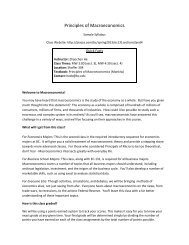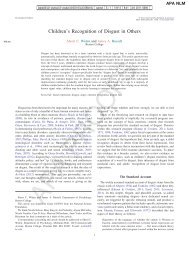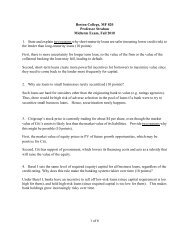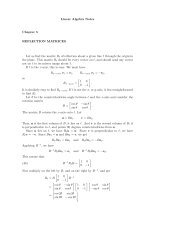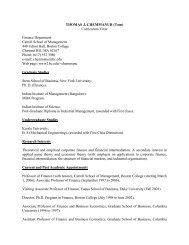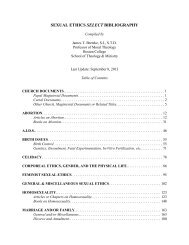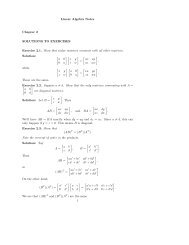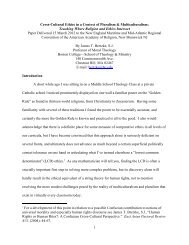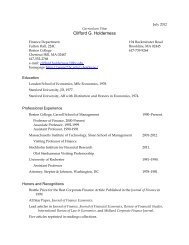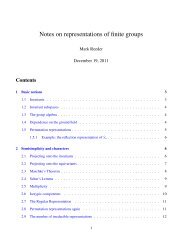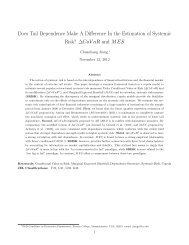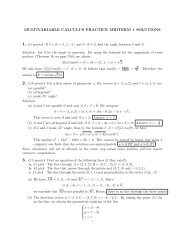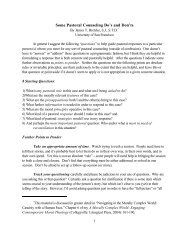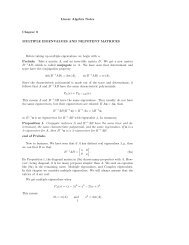Memory for specific visual details can be enhanced by negative ...
Memory for specific visual details can be enhanced by negative ...
Memory for specific visual details can be enhanced by negative ...
You also want an ePaper? Increase the reach of your titles
YUMPU automatically turns print PDFs into web optimized ePapers that Google loves.
E.A. Kensinger et al. / Journal of <strong>Memory</strong> and Language 54 (2006) 99–112 111<br />
Acknowledgments<br />
This research was supported <strong>by</strong> the National Institutes<br />
of Health Grants AG08411 (to D.L.S.) and<br />
MH070199 (to E.A.K.) and a National Science Foundation<br />
Graduate Research Fellowship (to R.J.G.E.). We<br />
thank Mickey Muldoon and Jacqueline OÕBrien <strong>for</strong><br />
assistance with stimulus selection, study design, and participant<br />
recruitment.<br />
References<br />
Abrisqueta-Gomez, J., Bueno, O. F., Oliveira, M. G., &<br />
Bertolucci, P. H. (2002). Recognition memory <strong>for</strong> emotional<br />
pictures in AlzheimerÕs patients. Acta Neurologica S<strong>can</strong>dinavica,<br />
105, 51–54.<br />
Adolphs, R., Denburg, N. L., & Tranel, D. (2001). The<br />
amygdalaÕs role in long-term declarative memory <strong>for</strong> gist<br />
and detail. Behavioral Neuroscience, 115, 983–992.<br />
Adolphs, R., Tranel, D., & Buchanan, T. W. (2005). Amygdala<br />
damage impairs emotional memory <strong>for</strong> gist but not <strong>details</strong><br />
of complex stimuli. Nature Neuroscience, 8, 512–518.<br />
Anderson, A. K., & Phelps, E. A. (2001). Lesions of the human<br />
amygdala impair <strong>enhanced</strong> perception of emotionally<br />
salient events. Nature, 411, 305–309.<br />
Armony, J. L., & Dolan, R. J. (2002). Modulation of spatial<br />
attention <strong>by</strong> fear-conditioned stimuli: An event-related<br />
fMRI study. Neuropsychologia, 40, 817–826.<br />
Bremner, J. D., Soufer, R., McCarthy, G., Delaney, R., Staib,<br />
L. H., Dun<strong>can</strong>, J. S., et al. (2001). Gender differences in<br />
cognitive and neural correlates of remembrance of emotional<br />
words. Psychopharmacological Bulletin, 35, 55–78.<br />
Brown, J. M. (2003). Eyewitness memory <strong>for</strong> arousing events:<br />
Putting things into context. Applied Cognitive Psychology,<br />
17, 93–106.<br />
Brown, R., & Kulik, J. (1977). Flashbulb memories. Cognition,<br />
5, 73–99.<br />
Burke, A., Heuer, F., & Reis<strong>be</strong>rg, D. (1992). Remem<strong>be</strong>ring<br />
emotional events. <strong>Memory</strong> & Cognition, 20, 277–290.<br />
Burton, L. A., Rabin, L., Vardy, S. B., Frohlich, J., Wyatt, G.,<br />
Dimitri, D., et al. (2004). Gender differences in implicit and<br />
explicit memory <strong>for</strong> affective passages. Brain and Cognition,<br />
54, 218–224.<br />
Cahill, L., Gorski, L., Belcher, A., & Huynh, Q. (2004). The<br />
influence of sex versus sex-related traits on long-term<br />
memory <strong>for</strong> gist and detail from an emotional story.<br />
Consciousness and Cognition, 13, 391–400.<br />
Christianson, S.-A., & Engel<strong>be</strong>rg, E. (1999). Organization of<br />
emotional memories. In T. Dalgleish & M. Power (Eds.),<br />
The handbook of cognition and emotion (pp. 211–227).<br />
Chichester, Sussex: Wiley.<br />
Christianson, S.-A., & Loftus, E. F. (1991). Remem<strong>be</strong>ring<br />
emotional events: The fate of detailed in<strong>for</strong>mation. Cognition<br />
and <strong>Memory</strong>, 5, 81–108.<br />
Coltheart, M. (1981). The MRC psycholinguistic database.<br />
Quarterly Journal of Experimental Psychology, 33A, 497–505.<br />
DÕArgem<strong>be</strong>au, A., & Van der Linden, M. (2004). Influence of<br />
affective meaning on memory <strong>for</strong> contextual in<strong>for</strong>mation.<br />
Emotion, 4, 173–188.<br />
Deffenbacher, K. A. (1983). The influence of arousal on<br />
reliability of testimony. In S. M. A. Lloyd-Bostock & B.<br />
R. Clif<strong>for</strong>d (Eds.), Evaluating witness evidence (pp. 235–251).<br />
Chichester, UK: Wiley.<br />
Denburg, N. L., Buchanan, T. W., Tranel, D., & Adolphs, R.<br />
(2003). Evidence <strong>for</strong> preserved emotional memory in normal<br />
older persons. Emotion, 3, 239–253.<br />
Dewhurst, S. A., & Parry, L. A. (2000). Emotionality, distinctiveness,<br />
and recollective experience. European Journal of<br />
Cognitive Psychology, 12, 541–551.<br />
Doerksen, S., & Shimamura, A. (2001). Source memory<br />
enhancement <strong>for</strong> emotional words. Emotion, 1, 5–11.<br />
Dolan, R. J., & Vuilleumier, P. (2003). Amygdala automaticity<br />
in emotional processing. Annals of the New York Academy<br />
of Sciences, 985, 348–355.<br />
Easterbrook, J. A. (1959). The effect of emotion on cue<br />
utilization and the organization of <strong>be</strong>havior. Psychological<br />
Review, 66, 183–201.<br />
Garoff, R. J., Slotnick, S. D., & Schacter, D. L. (2005). The<br />
neural origins of <strong>specific</strong> and general memory: The role of<br />
the fusi<strong>for</strong>m cortex. Neuropsychologia, 43, 847–859.<br />
Glanzer, M., & Adams, J. K. (1990). The mirror effect in<br />
recognition memory: Data and theory. Journal of Experimental<br />
Psychology: Learning, <strong>Memory</strong> and Cognition, 16, 5–16.<br />
Hamann, S., & Canli, T. (2004). Individual differences in<br />
emotion processing. Current Opinion in Neurobiology, 14,<br />
233–238.<br />
Henkel, L. A., Johnson, M. K., & DeLeonardis, D. M. (1998).<br />
Aging and source monitoring: Cognitive processes and<br />
neuropsychological correlates. Journal of Experimental<br />
Psychology: General, 127, 251–268.<br />
Heuer, F., & Reis<strong>be</strong>rg, D. (1990). Vivid memories of emotional<br />
events: The accuracy of remem<strong>be</strong>red minutiae. <strong>Memory</strong> &<br />
Cognition, 18, 496–506.<br />
Johansson, M., Mecklinger, A., & Treese, A. C. (2004).<br />
Recognition memory <strong>for</strong> emotional and neutral faces: An<br />
event-related potential study. Journal of Cognitive Neuroscience,<br />
16, 1840–1853.<br />
Johnson, M. K., Hashtroudi, S., & Lindsay, D. S. (1993).<br />
Source monitoring. Psychological Bulletin, 114, 3–28.<br />
Kensinger, E. A., Anderson, A., Growdon, J. H., & Corkin, S.<br />
(2004). Effects of Alzheimer disease on memory <strong>for</strong> verbal<br />
emotional in<strong>for</strong>mation. Neuropsychologia, 42, 791–800.<br />
Kensinger, E. A., Brierley, B., Med<strong>for</strong>d, N., Growdon, J. H., &<br />
Corkin, S. (2002). Effects of normal aging and AlzheimerÕs<br />
disease on emotional memory. Emotion, 2, 118–134.<br />
Kensinger, E. A., & Corkin, S. (2003). <strong>Memory</strong> enhancement<br />
<strong>for</strong> emotional words: Are emotional words more vividly<br />
remem<strong>be</strong>red than neutral words? <strong>Memory</strong> & Cognition, 31,<br />
1169–1180.<br />
Kensinger, E. A., & Corkin, S. (2004). The effects of emotional<br />
content and aging on false memories. Cognitive, Affective,<br />
and Behavioral Neuroscience, 4, 1–9.<br />
Kensinger, E. A., Piguet, O., Krendl, A. C., & Corkin, S.<br />
(2005). <strong>Memory</strong> <strong>for</strong> contextual <strong>details</strong>: Effects of emotion<br />
and aging. Psychology and Aging, 20, 241–250.<br />
Kensinger, E. A., & Schacter, D.L. (in press). Reality monitoring<br />
and memory distortion: Effects of <strong>negative</strong>, arousing<br />
content. <strong>Memory</strong> & Cognition.<br />
Koutstaal, W. (2003). Older adults encode—but do not always<br />
use—perceptual <strong>details</strong>: Intentional versus unintentional



